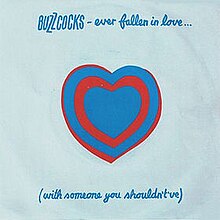Ever Fallen in Love
| "Ever Fallen in Love (With Someone You Shouldn't've)" | ||||
|---|---|---|---|---|
 |
||||
| Single by Buzzcocks | ||||
| from the album Love Bites | ||||
| B-side | "Just Lust" | |||
| Released | 1978 | |||
| Genre | ||||
| Length | 2:40 | |||
| Label | United Artists | |||
| Songwriter(s) | Pete Shelley | |||
| Producer(s) | Martin Rushent | |||
| Buzzcocks singles chronology | ||||
|
||||
"Ever Fallen in Love (With Someone You Shouldn't've)" is a 1978 song written by Pete Shelley and performed by his group Buzzcocks. It was a number 12 hit on the UK Singles Chart and was included on the album Love Bites.
Sometime during November 1977, the band watched the musical Guys and Dolls in the TV lounge of a guesthouse in Edinburgh, Scotland. It was the dialogue "Have you ever fallen in love with someone you shouldn't have" from the film which inspired the song. The following day Shelley wrote the lyrics of the song, in a van outside a post office, with the music following soon after. In an interview, Shelley said that the song was about a man named Francis that he lived with for about seven years.
The music and lyrics, as well as the singing, belong to Pete Shelley. The song uses the verse-chorus formal pattern and is in the key of E major. Both the verse and the chorus start with C# minor chords (sixth degree in E major), which "give [the song] a distinctly downbeat, edgy feel." The minor chords and the B-major-to-D-major move in the chorus are unusual for a 1970s punk song, yet they contribute to its ear-catching nature, along with the vocal melody. The verses feature a guitar riff and a double stroke tom-tom drum pattern over the E chord. The vocal melody ranges from G#3 to baritone F#4 in the verses and chorus; in the ending, Shelley hits a tenor G4 and then a G#4.
The lyrics consist of two verses (of which one is repeated) and a chorus. According to music critic Mark Deming, "the lyrics owe less to adolescent self-pity than the more adult realization of how much being in love can hurt – and how little one can really do about it."
...
Wikipedia
